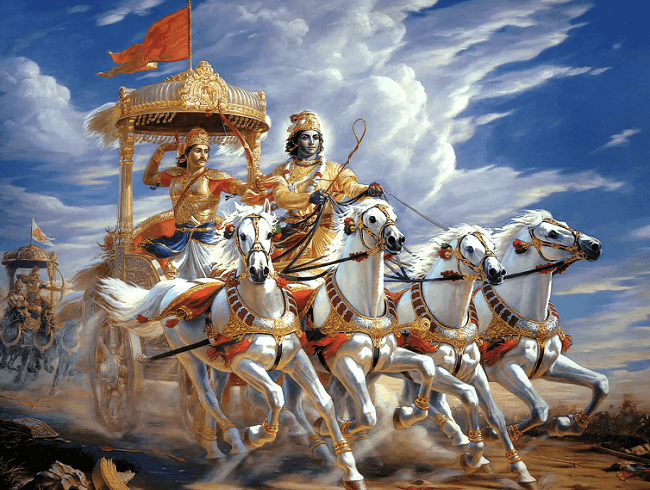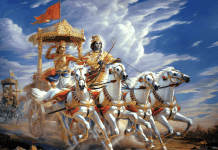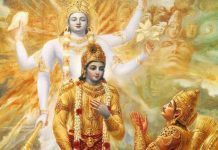The opening chapter of the Bhagavad Gita sets the stage for a profound and timeless discourse on duty, morality, and self-realization. Amidst the preparations for a dharmic war (righteous war), Arjuna, the valiant Pandava prince, experiences a crippling moral crisis. Doubts cloud his judgment, and Chapter 1, verses 32 to 35, offer a poignant glimpse into his internal struggle.
A Battlefield of Kin:
The scene is set on the Kurukshetra battlefield. Two armies stand poised for conflict: the Pandavas, led by Arjuna, and the Kauravas, their cousins. As Arjuna surveys the battlefield, verse 32 reveals his horrifying realization – the opposing side is filled with familiar faces: his teachers, fathers, sons, and other relatives. The prospect of fighting his own kin for the sake of a kingdom fills him with dread.
A Clash of Duty and Compassion:
Verse 33 exposes the depth of Arjuna’s moral dilemma. He questions the very purpose of war if it involves killing those he loves and protects. He ponders the futility of attaining wealth, happiness, and even life through violence against his own family.
Disgust and Despair:
The prospect of war becomes increasingly repugnant to Arjuna. Verse 34 expresses his disgust at the thought of slaying his elders and relatives. He contemplates a life of begging as preferable to the destruction of his own lineage. The emotional turmoil he experiences is palpable.
Beyond Victory, a Legacy of Loss:
Verse 35 delves deeper into Arjuna’s anguish. He envisions the war leading to the annihilation of family traditions and social order. He questions the meaning of victory if it comes at the cost of such devastation. The potential loss of his loved ones and the societal repercussions weigh heavily on his conscience.
The Seeds of Transformation:
Arjuna’s moral crisis forms the crucial turning point of the Bhagavad Gita. His reluctance to fight prompts Krishna, his charioteer and divine guide, to deliver his profound discourse on dharma, karma (action), and self-realization. Over the course of the Bhagavad Gita, Krishna guides Arjuna towards fulfilling his warrior duty while upholding righteousness.
A Universal Conflict:
While the Bhagavad Gita is set in a specific historical context, Arjuna’s moral struggle resonates with readers across time and cultures. We all face internal conflicts between duty, personal desires, and compassion. The Bhagavad Gita reminds us to confront these challenges with clarity and integrity.
The opening verses of Chapter 1 present a compelling human drama. They expose the vulnerability and moral complexity that even the most valiant warriors can experience. Arjuna’s conflict serves as a powerful reminder that the path of righteousness is rarely straightforward, and true strength lies not just in physical prowess but also in the courage to confront our inner demons.






































